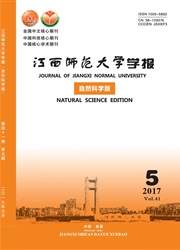

 中文摘要:
中文摘要:
肥大细胞受到抗原刺激后释放组胺是过敏反应的重要过程,对组胺释放的抑制能力是评价抗过敏药物的重要因素.选取多种传统中医记载具有抗过敏作用的中草药,检测了其在体外对肥大细胞脱颗粒并释放组胺的抑制效果.在具有明显效果的中草药中,土茯苓与芍药对于抑制肥大细胞脱颗粒最为突出,IC50分别为62.5μg/mL和113.8μg/mL.土茯苓的突出药效(药物浓度为500μg/mL时抑制率达到95.63%)未曾被报道,具有研究与开发价值.对其机理的初步研究表明蛋白激酶A可能是土茯苓抑制肥大细胞脱颗粒的重要靶点.
 英文摘要:
英文摘要:
Mast cell is considered to be a key actor for the allergic inflammation.Upon presentation of the antigen they could release histamine.The inhibition of histamine releasing is usually used as major element to evaluate the anti-allergy activity of drugs.Diverse herbs which released allergy and inflammation' symptom,were selected their depressant effect on mast cells' degranulation and the release amount of histamine in vitro were detected.Among the efficient herbs,Glabrous Greenbrier Rhizome and Paeonia Veitchii showed more rejection capability on mast cells' degranulation as the IC50 of these two kinds of herb were 62.5 μg/mL and 113.8 μg/mL,respectively.Glabrous Greenbrier Rhizome is worth to be studied due to its conspicuous efficient(the inhibition ratio is 95.63% with the concentration of 500 μg/mL) which has not been reported.The mechanism research suggested that protein kinase A may be one of the target point of Glabrous Greenbrier Rhizome's depressant effect on mast cells' degranulation.
 同期刊论文项目
同期刊论文项目
 同项目期刊论文
同项目期刊论文
 A Novel Technique for In Situ Aggregation of Gluconobacter oxydans Using Bio-Adhesive Magnetic Nanop
A Novel Technique for In Situ Aggregation of Gluconobacter oxydans Using Bio-Adhesive Magnetic Nanop 期刊信息
期刊信息
